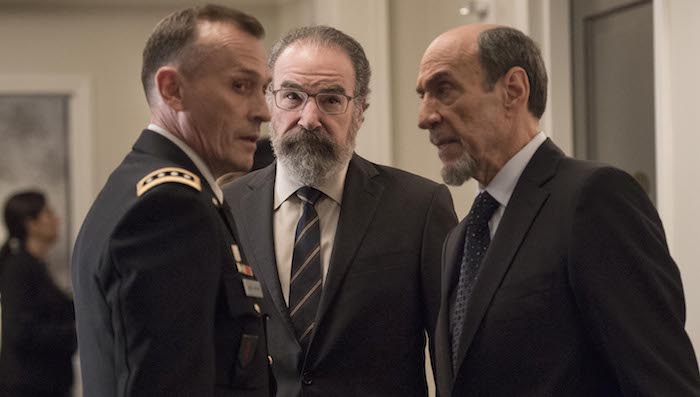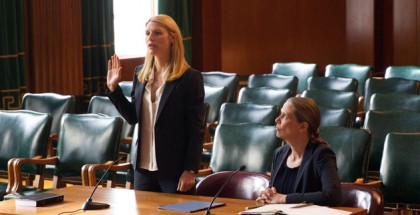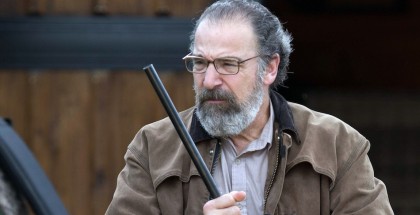Netflix UK TV review: Homeland Season 6
Review Overview
Slow start
6Suspenseful second half
9Real world relevance
9David Farnor | On 23, Apr 2017
Warning: This contains minor spoilers – and some major spoilers for Season 5. If you haven’t seen Season 5, click here for our review and how to catch up.
“You’re a bad dream: a President who can’t be controlled from within.”
As Donald Trump settles into his role as the USA’s new president, any political TV drama would struggle to live up to the events of real life – so it’s fascinating that Homeland clearly called the election wrong, kicking off Season 6 with the introduction of female President-elect, Elizabeth Keane (Elizabeth Marvel). Rather than rush to get her hands on nuclear codes, she mostly seems concerned with transparency and stepping down America’s drone missions. Liberal viewers, it seems, can sigh: Season 6 may well be The West Wing of Homeland we’ve been waiting for.
And what of Carrie? Claire Danes’ former agent is now on US soil, several months after Season 5’s Berlin attack, but is working at a charitable foundation that helps the country’s Muslim community.
It’s only a matter of time, of course, until Saul (Mandy Patinkin) and Carrie cross paths, and within two episodes, her former boss heads to her office to ask whether she’s advising Keane, as the CIA take against the new POTUS’ more moral view of the world. Carrie says no, marking one of the rare times that she’s lied to him outright – and that unexpected detour in their relationship lays the foundation for a promising season. So when Keane is asked by Dar Adal (F. Murray Abraham) in a restaurant to help investigate a possible breach in the US-Iran nuclear deal, Carrie’s eventual advice for the President-elect’s team takes an even more intriguing twist: she recommends sending Saul, because he’s “trustworthy”. Saul, of course, can see straight through her lies. Probably because of his magic beard.
Meanwhile, Peter Quinn (Rupert Friend) is alive, but far from well, as his PTSD sees him descend into new depths of drugs and other bad things, struggling to make it through existence, even as Carrie takes him to live with her and her daughter.
The result is a slow start to the season, not least because of Quinn’s irrelevant trials and tribulations – it initially feels like a cheat to have brought him back. But while your attention may wander at first, Homeland is quietly tying its narrative threads together with taut precision – and a baby-sitting session gone wrong suddenly kicks the show into the kind of gripping gear that we expect from the series at its peak. At the same time as the claustrophobia increases, the show’s scale expands: Saul takes a trip to Abu Dhabi (including a chance to catch up with his sister – yet another layer added to Homeland’s best character) and begins to uncover a conspiracy surrounding Iran that spirals into a dramatic web of deception. And so begins a superb rug-pull by Season 6’s writers.
At its heart is Dar Adal, who tells Keane that Saul is finding “conclusive” evidence about Iran’s breaking of the nuclear treaty. Patinkin is as world-weary as ever, but Abraham delivers his best performance to date, acting the hell out of his sinister part, enjoying the chance to twirl his own beard at each possibly opportunity. Every time he turns dramatically away from the President-elect, he takes 10 seconds longer than necessary, just to eke out every frame of his screen-time. They’re the perfect double act, Dar as confident and smooth as Berensen is weary and gruff – and their chemistry and loyalty to each other over the years gives a fresh new edge to the shifting balance in the corridors of power, one that threatens to tear apart these two friends.
Carrie is pitched headfirst into that simmering conflict, thanks to a terrible decision to break the law to help free a client accused of posting radical videos on the Internet. The result is one of the show’s conversations about ethics and trying to make a difference that is simultaneously on-the-nose and commendable, as Danes’ officer visibly wrestles with the conundrum of her post-CIA work. It’s a nice opportunity, too, for Carrie’s signature Cry Face to be caused by something professional rather than personal (although a farewell to a notable character in one episode allows for that as well).
This is Homeland back at its very best, pitting its ensemble against each other to explore the grey areas in modern security. And those grey areas are sketched out in wonderfully small details, from the shocking use of the freezer in Dar Adal’s favourite restaurant to the trust that builds between Max and Carrie, as he steps up to help her investigate the unfolding conspiracy. The more that showrunner Alex Gansa uncovers, the more the show takes an unexpectedly brilliant swerve towards real life, nodding to leaks, propaganda and fake news along the way – right down to a Fox News-alike presenter, Brett O’Keefe, shouting outrage at a camera to a bunch of hoax users filling up the Internet with anger to drive a particular political agenda.
By the time we reach the final episodes, the plot forces Carrie and Quinn into a hotel room, with Rupert Friend more than earning his return from the dead after Season 5, putting in the kind of heroic, gun-toting set piece that’s so nail-biting it could belong in 24. And, at the centre of it all, is that central question: should the CIA be allowed to go to the extremes that it does?
Season 5 laid the groundwork for the intelligence community to become the villains, to some degree, and Season 6 explicitly examines the issue without holding back. “It was never my intention for things to turn so dark,” admits Dar, during one of many heart-to-hearts with Saul. After watching them in action for several seasons, there’s a gnawing sense that these spooks really have done more harm than good, between allowing Brody into the White House and letting a Russian mole infiltrate Berlin. But even Adal is a man of ambiguous charm, as he almost justifies his use of cruel interrogation techniques to save a vital life – you may not ever be on his side, but the show continues to muddy the water until it’s hard to point the finger at individuals anymore.
Keane, though, isn’t above pointing the finger at a whole establishment – and the President-elect emerges as the show’s MVP over these 12 episodes, as she fights for the memory of his son, who died in Afghanistan, faces propaganda undermining her and gets closer and closer to Carrie. Elizabeth Marvel takes Keane on a surprisingly impressive character arc, balancing caring mother with ruthless ruler to fascinating effect. It’s like she’s been in Homeland for years – not bad going, given this is the first time she’s been on the show. Talk of a new kind of politics and a new era of accountability, which Carrie welcomes after seeing how power can corrupt, weaves a deceptively complex tale with a subtly explosive pay-off, a timely study of nation and policing that manages to reflect current headlines while also going one step further.
In an age where Trump is President and reality has become more ridiculous than fiction, Homeland risked looking outdated and dull, especially with a female POTUS. But where Homeland once thrived on being outrageous, Season 6 doubles down on plausibility, reviving the paranoia that fuelled its opening runs with renewed vigour, making Homeland perhaps more relevant than ever. The West Wing this ain’t. And Homeland’s superb, provocative, pertinent sixth season reminds us that whatever happens, a President who can’t be controlled is never a good thing.
Homeland: Season 6 is available on Netflix UK, as part of an £9.99 monthly subscription.






















